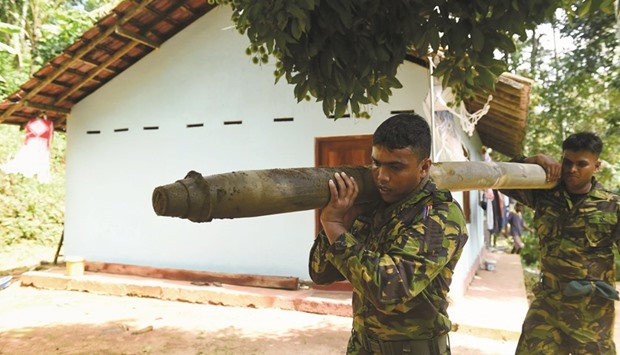Sri Lankan police were yesterday racing to defuse unexploded bombs that fell on villages near the capital overnight and destroyed hundreds of homes, after a huge and deadly fire at an ammunition depot.
At least one soldier burnt to death and thousands of villagers fled their homes after fire broke out at the Salawa military complex late Sunday, triggering a series of explosions that sent shrapnel flying into the air.
Local businessman Neville Nishantha fled with his wife and three children as the explosions began and returned yesterday morning to see his house in ruins.
“A mortar bomb had gone through my roof and hit the living room,” Nishantha said.
“A wall collapsed in the bedroom where my three children would have slept.”
Yesterday police Special Task Force commandos were deployed to defuse multi-barrel rockets, artillery rounds, rocket-propelled grenades and mortar bombs which landed in residential areas.
An AFP photographer saw commandos collecting at least four unexploded rockets, one of which was lodged in the ground outside an abandoned home.
“Forensic experts have examined the site and we have just begun clearing the main roads of all unexploded ordnance,” a senior police official said.
An aerial view of the army complex from a nearby mountaintop showed only a water tower remained relatively intact. All the buildings were either completely destroyed or had their roofs blown out.
Nearly 50 people were treated for injuries or smoke inhalation after the fire, which forced the evacuation of the local government hospital. Police said the facility had been badly damaged.
Former president Mahinda Rajapakse said his administration had planned to relocate the ammunition dump from the built-up area before he was defeated in the January 2015 election.
“My government had plans to relocate this ammunition depot but the new government has failed to execute it,” he said.
Prime Minister Ranil Wickremesinghe visited the devastated area yesterday and promised to rebuild destroyed homes, his office said.
Authorities have yet to establish the cause of the fire which began at sundown Sunday and continued until yesterday morning.
Government spokesman Rajitha Senaratne said the national security council was due to review the blast.
“This is a military matter and they must investigate if this was an accident or sabotage,” said Senaratne.
One of the affected villages housed widows and wounded veterans from Sri Lanka’s long civil war, who had to cross a river to safety.
“We took a boat and went across the Kelani river and took shelter at a temple,” said 53-year-old widow Mahilagodage Rohini.
“Most of the houses at our (Swarna Jayanthi) village have been destroyed.”
Wasantha Fernando, 45, said he abandoned his home and ran as thick black smoke filled the area.
“When I got back this morning the entire place was covered in ash,” he said, adding that his walls had cracked and the house was unstable.
Residents of high-rise buildings in Colombo said they could see the fire at the Salawa military complex, about 36km (22 miles) east of the capital.
The camp occupies a former plywood factory that was used to store heavy weaponry and ammunition, including rockets.
Sri Lanka’s decades-long Tamil separatist war ended in May 2009.
It was the second time in three weeks that residents around the capital had been forced to leave their homes.
Last month, around 200,000 residents of Colombo had to flee floods when the Kelani river burst its banks.

Sri Lanka Special Task Force soldiers carrying a multi-barrel rocket launcher at Salawa, on the edge of the capital Colombo yesterday, a day after an explosion at an ammunition depot at the neighbouring military complex.
